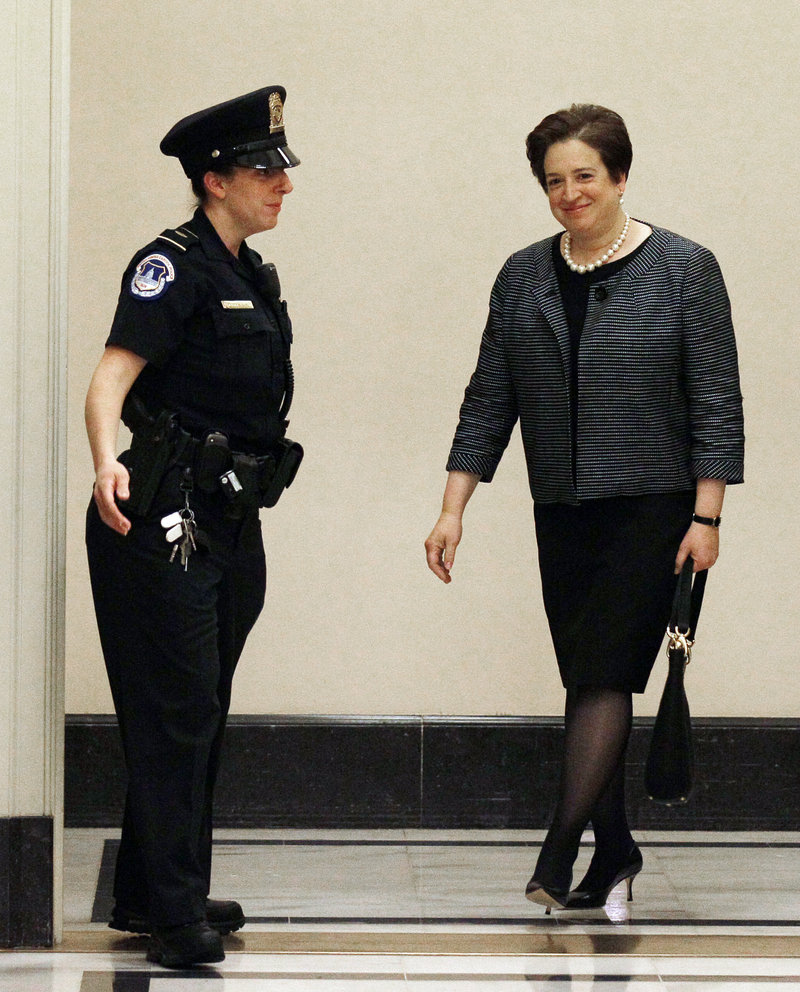WASHINGTON – As a Clinton White House aide, Supreme Court nominee Elena Kagan called herself one of the administration’s biggest fans of a law to protect religious freedom but warned then-Vice President Al Gore against endorsing it for fear of creating “a gay/lesbian firestorm.”
In a 1999 e-mail, Kagan said the White House was meeting with religious and gay groups to try to smooth over their differences on the matter.
“We’ll let you know as soon as it’s safe to go back in the water,” she wrote to Ron Klain, who was Gore’s chief of staff and now holds the same job for Vice President Joe Biden.
The missive — one of tens of thousands of pages of Kagan’s e-mails released Friday — shows how as an aide to President Clinton, Kagan’s job was often to place political considerations ahead of her policy views.
The e-mails also portray Kagan as a driven and highly opinionated person who has a flair for political tactics and little tolerance for high-flying rhetoric.
Shortly after Clinton gave his second inaugural address, Kagan e-mailed her boss, Bruce Reed, director of the Domestic Policy Council, to say she thought one of the president’s marquee lines quoting the prophet Isaiah was “the most preposterously presumptuous line I have ever seen.”
The line — often referenced in discussions of mending racial discord — is “Thou shalt raise up the foundations of many generations, and thou shalt be called the repairer of the breach, the restorer of paths to dwell in.”
Kagan tells Reed in the note that Clinton would deserve it if “the press really came down on him” for delivering it.
At the beginning of her stint as a domestic policy aide, Kagan described her management style to a colleague this way: “I want to be kept generally up to speed on everything. Thanks.”
Later that year, she suggested transforming what was supposed to be a routine literacy event at a Maryland school into a chance to score points against the Republican Congress. At the time, the administration was pushing for a national standardized test to measure student progress and the GOP was expected to try to block funding for the exam.
“We are in a fight for our lives on the testing initiative,” Kagan wrote. “We cannot waste Sept. 8 on a sweetness-and-light literacy event. We’re all going to have to work together to make this problem disappear.”
The e-mails were part of the William J. Clinton Presidential Library’s final release of documents related to Kagan’s service as a domestic policy aide and White House counsel. The Senate Judiciary Committee requested the documents in preparation for its hearings on Kagan’s nomination, scheduled to begin June 28.
This was the third week in a row the files were made public on a Friday afternoon — the customary time in official Washington for dribbling out unfavorable information or disclosures one hopes won’t draw too much attention.
Another roughly 80,000 pages of paper files had been released previously, revealing Kagan’s role in managing the scandals of the Clinton administration, her pragmatic streak dealing with complex issues such as tobacco regulation and her political instincts weighing in on issues such as abortion, gun control and drug sentencing.
The White House and Clinton have opted to keep a small fraction of the information private, allowing only Judiciary panel members and their top aides to see some documents and keeping secret anything of a strictly personal nature.
But the 160,000 pages of information — including some 80,000 pages of e-mail — is far more than the committee received for other recent high court nominees.
Send questions/comments to the editors.



Success. Please wait for the page to reload. If the page does not reload within 5 seconds, please refresh the page.
Enter your email and password to access comments.
Hi, to comment on stories you must . This profile is in addition to your subscription and website login.
Already have a commenting profile? .
Invalid username/password.
Please check your email to confirm and complete your registration.
Only subscribers are eligible to post comments. Please subscribe or login first for digital access. Here’s why.
Use the form below to reset your password. When you've submitted your account email, we will send an email with a reset code.